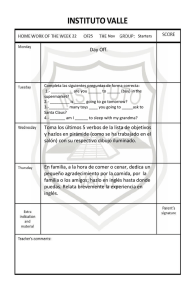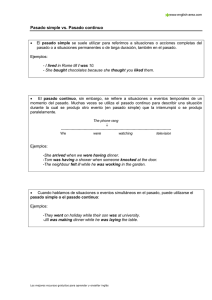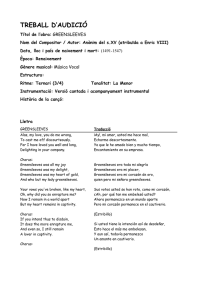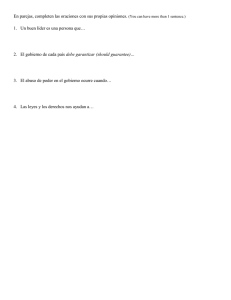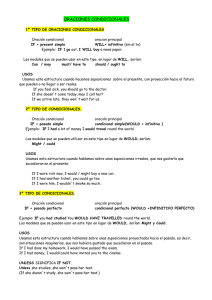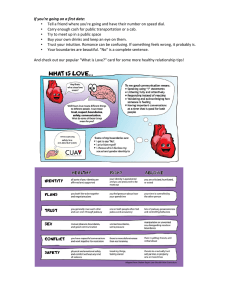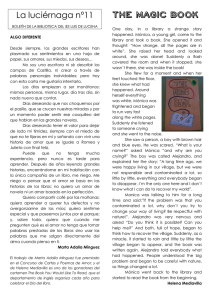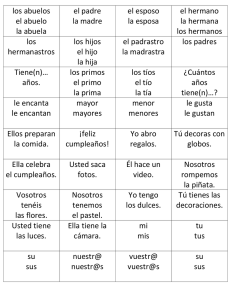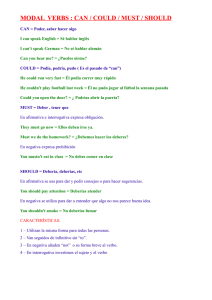Comp-LAE-II
Anuncio
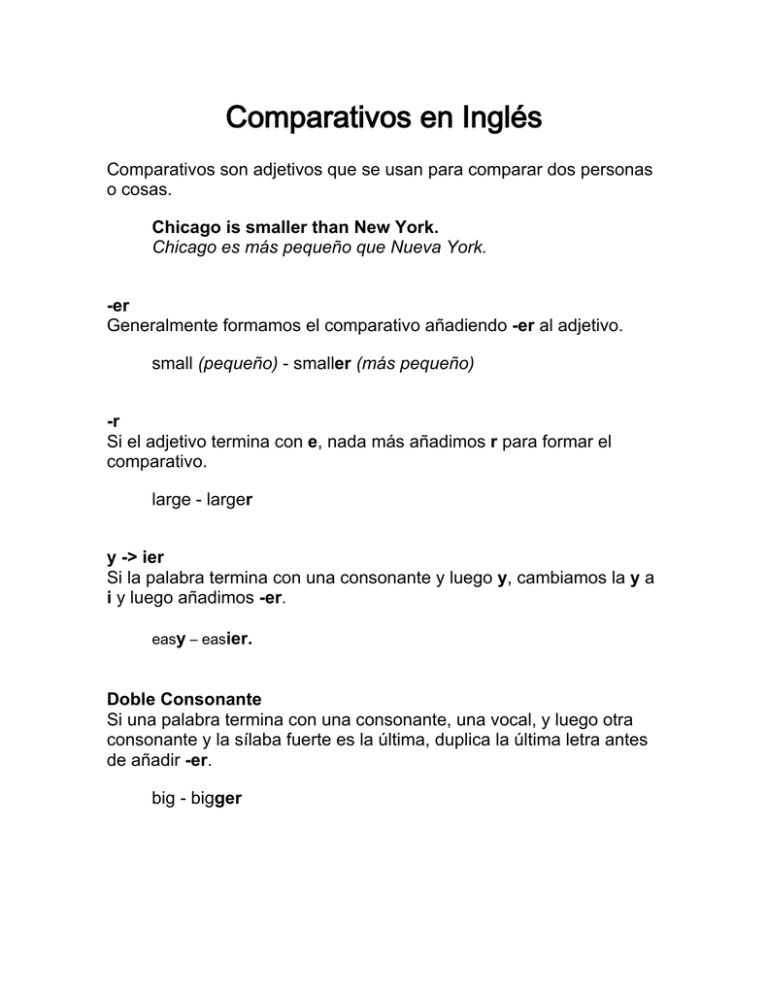
Comparativos en Inglés Comparativos son adjetivos que se usan para comparar dos personas o cosas. Chicago is smaller than New York. Chicago es más pequeño que Nueva York. -er Generalmente formamos el comparativo añadiendo -er al adjetivo. small (pequeño) - smaller (más pequeño) -r Si el adjetivo termina con e, nada más añadimos r para formar el comparativo. large - larger y -> ier Si la palabra termina con una consonante y luego y, cambiamos la y a i y luego añadimos -er. easy – easier. Doble Consonante Si una palabra termina con una consonante, una vocal, y luego otra consonante y la sílaba fuerte es la última, duplica la última letra antes de añadir -er. big - bigger "More" con Palabras Largas Si la palabra es de dos sílabas o más (una palabra larga) y no termina con y, usamos la palabra more, en vez de -er. expensive - more expensive Práctica 1: Cambia las palabras a comparativos. Ejemplo Tall- taller. 1. cold. 2. nice. 3. heavy. 4. clean. 5. wide. 6. hot. 7. good. 8. rich. 9. long. 10. ugly. 11. economical. 12. dry. 13. thin. 14. modern. 15. bad. 16. cheap. 17. lazy. 18. beautiful. 19 far. 20. wet.. Práctica 2: Utiliza las palabras dadas para escribir oraciones comparativas. ejemplo 1.Bob/tall/Richard – Bob is taller than Richard. 2. Movies/interesting/TV shows – 3. Sharon/beautiful/Raquel – 4. This book/important/that book – 5. Your house/old/my house – 6. Harry/funny/Paul – 7. Karen/young/Alice – 8. Children/energetic/adults – 9. Tea is cheaper than champagne – Práctica 3: Instrucciones Busca el error en las siguientes oraciones. Escribe la oración corregida. Ejemplo: 1. 2. 3. 4. 5. He are a student. - He is a student. Sam is more short than Fred. My car is expensiver than yours. This picture is uglyer than that picture. The movie is very exciteing. This table is more bigger than that table. Superlativos en Inglés Se usan los superlativos para indicar un extremo en un grupo de cosas. Bob is the tallest student in the class. Bob es el estudiante más alto de la clase. -est Generalmente formamos el superlativo añadiendo el sufijo -est al adjetivo. small (pequeño) - the smallest (el más pequeño) -st Si el adjetivo termina con e, nada más añadimos -st para formar el superlativo. large - the largest y -> iest Si una palabra termina con una consonante y luego y, cambiamos la y a -iest. easy - the easiest Doble Consonante Si una palabra termina con una consonante, una vocal, y luego otra consonante y la sílaba fuerte es la última, duplica la última letra antes de anadir -est. big - the biggest "Most" con Palabras Largas Si la palabra es de dos sílabas o más (una palabra larga) y no termina con y, usamos la palabra most, en lugar de -est. expensive - the most expensive Superlativos Irregulares good - the best bad - the worst far - the farthest Práctica 4: Cambia las palabras a superlativos. Ejemplo: tall- the tallest. 1.cold. 11. economical. 2.nice. 12. dry. 3.heavy. 13. thin. 4.clean. 14. modern. 5.wide. 15. bad. 6.hot. 16. cheap. 7.good. 17. lazy. 8.rich. 18. beautiful. 9.long. 19 far. 10.ugly. 20. wet.. Práctica 5: Escribe oraciones superlativas con las palabras dadas. ejemplo Bob/is/tall student/in the class 1. 2. 3. 4. 5. 6. 7. 8. Sharon/is/nice person/I know Life is Beautiful/is/interesting movie Gino's Pizzeria/has/good pizza/in Chicago Paul/is/funny person/I know Helen/is/beautiful woman/I know Fred/has/big house/in our neighborhood She/is/bad cook/in our family That/is/small car/in the parking lot RESPUESTAS: Practica 1: 1. Colder 2. Nicer 3. Heavier. 4. Cleaner. 5. Wider. 6. Hotter. 7. Better. 8. Richer. 9. Longer. 10. Uglier. 11. More economical. 12. Drier. 13. Thinner. 14. More modern. 15. Worse 16. Cheaper. 17. Lazier. 18. More beautiful. 19. Farther. 20. Wetter. Practica 2: 1. 2. 3. 4. 5. 6. 7. 8. 9. Bob is taller than Richard. Movies are more interesting than TV shows. Sharon is more beautiful than Raquel. This book is more important than that book. Your house is older than my house. Harry is funnier than Paul. Karen is younger than Alice. Children are more energetic than adults. Tea is cheaper than champagne. Practica 3: 1. Sam is shorter than Fred. 2. My car is more expensive than yours. 3. This picture is uglier than that picture. 4. The movie is very exciting. 5. This table is bigger than that table. Practica 4: 1. the coldest. 2 the wettest 3 the nicest 4 the heaviest 5 the cleanest 6 the widest 7 the hottest 8 the best 9 the richest 10 the longest 11 the ugliest 12 the most economical 13 the driest 14 the thinnest 15 the most modern 16 the worst 17 the cheapest 18 the laziest 19 the most beautiful 20 the farthest. Practica 5: 1. 2. 3. 4. 5. 6. 7. 8. Sharon is the nicest person I know. Life is Beautiful is the most interesting movie. Gino's Pizzeria has the best pizza in Chicago. Paul is the funniest person I know. Helen is the most beautiful woman I know. Fred has the biggest house in our neighborhood. She is the worst cook in our family. That is the smallest car in the parking lot. Practica 6: 1. He is ten years old. 2. I have straight hair. 3. He has a mustache. 4. They are tall. 5. She has brown hair . Physical characteristics — Características físicas tall slim fat well-built overweight short medium height thin well-dressed smart good-looking attractive beautiful pretty handsome ugly old young middle-aged bald bald-headed beard moustache long hair short hair straight hair curly hair fair-haired blond-haired o blonde-haired brown-haired alto/a delgado/a gordo/a fornido/a con sobrepeso bajo/a de talla media flaco/a bien-vestido/a elegante buen parecido/a atractivo/a bello/a guapa guapo feo/a viejo/a joven de mediana edad calvo/a con la cabeza calva barba bigote pelo largo pelo corto pelo liso pelo rizado de pelo rubio de pelo rubio de pelo castaño dark-haired ginger-haired blonde brunette redhead de pelo moreno pelirrojo/a rubio/a moreno/a pelirrojo/a Feelings — Sentimientos happy sad miserable worried depressed excited bored fed up pleased delighted surprised disappointed enthusiastic relaxed stressed anxious calm tired exhausted angry annoyed feliz triste muy triste preocupado/a deprimido/a excitado/a aburrido/a harto/a satisfecho/a muy contento/a sorprendido/a decepcionado/a entusiasmado/a relajado/a estresado/a ansioso/a tranquilo/a cansado/a muy cansado/a enfadado/a molesto/a disgusted asqueado/a, indignado/a Emotional characteristics — Características emocionales confident sensitive calm hot-headed impulsive cheerful generous kind mean crazy sensible serious honest good-humoured bad-tempered moody dishonest hard-working clever intelligent arrogant snobbish happy unhappy stupid lazy outgoing cautious adventurous seguro/a sensible calmado/a temperamental / de sangre caliente impulsivo/a alegre generoso/a amable tacaño/a loco/a sensato/a, prudente serio/a honesto/a de buen humor tiene mal genio de humor cambiante deshonesto/a trabajador listo/a inteligente arrogante esnob feliz infeliz estúpido/a vago/a extrovertido/a cauteloso/a aventurero/a shy introverted extroverted easy-going rude bad-mannered impolite emotional polite funny witty boring patient impatient sophisticated cheeky friendly unfriendly conceited brave cowardly absent-minded talented modest tímido/a introvertido/a extrovertido/a despreocupado/a maleducado/a, grosero/a con malas maneras maleducado/a sensible, emocionado/a educado/a divertido/a ingenioso/a, agudo/a aburrido/a paciente impaciente sofisticado/a impertinente, descarado/a amigable antipático/a vanidoso/a valiente cobarde despistado/a talentoso/a modesto/a ____(he/she)______(is/has) 30 years old. ____(he/she)______(is/has) thin. ____(he/she)______(is/has) nice. ____(he/she)______(is/has)______(black/brown/blonde/red) hair. ____(he/she)______(is/has)_______(long/short) hair. ____(he/she)______(is/has)_______(curly/wavy/straight) hair. ____(he/she)______(is/has) eight years old. ____(he/she)______(is/has) short. ____(he/she)______(is/has) serious. ____(he/she)______(is/has)______(black/brown/blonde/red) hair. ____(he/she)______(is/has) elderly. ____(he/she)______(is/has)______(black/brown/gray/red) hair. ____(he/she)______(is/has/wears) glasses. ____(he/she)______(is/has) old. ____(he/she)______(is/has) a beard and mustache. ____(he/she)______(is/has)______(black/brown/gray/red) hair. Practica 6: Instrucciones Busca el error en las siguientes oraciones. Escribe la oración corregida. ejemplo He are a student. - He is a student. 1. He has ten years old. 2. I have streight hair. 3. He has a mustach. 4. They is tall.. 5. She has hair brown. 1http://www.inglesmundial.com/Ingles_Intermedio_Leccion13/Ingles_Intermedio_Leccion1 3_Gramatica.html 2http://www.speakenglish.co.uk/vocab/describing_people?lang=es RELATAS MOMENTOS IMPORTANTES DEL PASADO Past Simple: Hace referencia a situaciones totalmente acabadas y sin vínculo con el momento presente. Pasado simple del verbo "To be" El pasado simple del verbo "To be" (ser o estar) se forma cambiando las formas "am" e "is" por "was" y la forma "are" por "were". Por lo demás, para formar la negativa y la interrogativa la forma es la misma que en el presente simple. A continuación veremos las formas afirmativa, negativa en interrogativa del verbo "to be" en pasado: Afirmativa: I was: yo era o yo estaba. You were: tú eras o tú estabas. He was: él era o él estaba. She was: ella era o ella estaba. It was: eso era o eso estaba. We were: nosotros eramos o nosotros estábamos. You were: vosotros erais o vosotros estabais. They were: ellos eran o ellos estaban. Negativa: I was not: yo no era o yo no estaba. You were not: tú no eras o tú no estabas. He was not: él no era o él no estaba. She was not: ella no era o ella no estaba. It was not: eso no era o eso no estaba. We were not: nosotros no eramos o nosotros no estábamos. You were not: vosotros no erais o vosotros no estabais. They were not: ellos no eran o ellos no estaban. Interrogativa: Was I?: ¿era yo? o ¿estaba yo? Were you?: ¿eras tú? o ¿estabas tú? Was he?: ¿era él? o ¿estaba él? Was she?: ¿era ella? o ¿estaba ella? Was it?: ¿era eso? o ¿estaba eso? Were we?: ¿eramos nosotros? o ¿estabamos nosotros? Were you?: ¿erais vosotros? o ¿estabais vosotros? Were they?: ¿eran ellos? o ¿estaban ellos? Ejemplos: ·He was my friend when I was twelve years old → Él era mi amigo cuando yo tenía doce años. ·I wasn't at school at half-past eleven → Yo no estaba en el colegio a las once y media. ·Were they at home yesterday? → ¿Estaban ellos ayer en casa? (no confundir "where (donde)" con were). Para terminar, decir que las formas negativas contraídas son: was not → wasn't were not → weren't. TRATA DE RECORDAR LO SIGUIENTE ... El pasado del verbo to be no tiene formas contractas o reducidas para el afirmativo. Es decir, no puedes decir I's como reducción de I was o You're en lugar de You were. En cambio, puedes usar contracciones en el negativo: I WASN'T en reemplazo de I was not y YOU WEREN'T en lugar de You were not. IMPORTANTE: I WAS significa tanto YO FUI (del verbo SER, no de IR) como YO ERA lo cual suele confundir a muchos estudiantes hispanohablantes. Observa estos ejemplos: All his life he WAS a teacher. Toda su vida él FUE maestro. << aquí FUE no deriva del verbo IR (decir: "Toda su vida él ERA maestro" es incorrecto en español). My grandfather WAS Italian. Mi abuelo ERA italiano. << aqui queda mejor usar ERA que FUE. ABAJO TIENES EL VERBO "TO BE" EN PASADO SIMPLE. Verb "to be" Verbo "ser - estar" (Pasado) POSITIVE AFIRMATIVO Como verbo SER Como verbo ESTAR ENGLISH I was ESPAÑOL Yo era/fui ENGLISH I was ESPAÑOL Yo estaba/estuve You were Tú eras/fuiste Usted era/fue You were Tú estabas/estuviste Usted estaba/estuvo He was Él era/fue He was Él estaba/estuvo She was Ella era/fue She was Ella estaba/estuvo It was Él/Ella era/fue It was Él/Ella estaba/estuvo We were Nosotros éramos Nosotros fuimos We were Nosotros estábamos Nosotros estuvimos You were Vosotros érais/fuisteis (*) Ustedes eran (**) Ustedes fueron (**) You were Vosotros estábais/estuvisteis (*) Ustedes estaban (**) Ustedes estuvieron (**) They were Ellos/as eran/fueron They were Ellos/as estaban/estuvieron (*) más utilizado en España; (**) más utilizado en América Latina. INTERROGATIVE Como verbo SER INTERROGATIVO Como verbo ESTAR ENGLISH Was I? ESPAÑOL ¿Era yo? ¿Fui yo? ENGLISH Was I? ESPAÑOL ¿Estaba yo? ¿Estuve yo? Were you? ¿Eras tú? ¿Fuiste tú? ¿Era usted? ¿Fue usted? Were you? ¿Estabas tú? ¿Estuviste tú? ¿Estaba usted? ¿Estuvo usted? Was he? ¿Era él? ¿Fue él? Was he? ¿Estaba él? ¿Estuvo él? Was she? ¿Era ella? ¿Fue ella? Was she? ¿Estaba ella? ¿Estuvo ella? Was it? ¿Era él (ella)? ¿Fue él (ella)? Was it? ¿Estaba él (ella)? ¿Estuvo él (ella)? Were we? ¿Éramos nosotros? ¿Fuimos nosotros? Were we? ¿Éstábamos nosotros? ¿Estuvimos nosotros? Were you? ¿Érais/Fuisteis vosotros? (*) ¿Eran/Fueron ustedes? (**) Were you? ¿Estábais vosotros? (*) ¿Estaban/Estuvieron ustedes? (**) Were they? ¿Eran ellos? ¿Fueron ellos? Were they? ¿Estaban ellos? ¿Estuvieron ellos? (*) más utilizado en España; (**) más utilizado en América Latina. NEGATIVE NEGATIVO Como verbo SER o ESTAR ENGLISH ESPAÑOL Normal Contracted Normal Contracción I was not I wasn't Yo no era/no fui Yo no estaba/no estuve No era/No fui No estaba/No estuve You were not You weren't Tú no eras/no fuiste Usted no era/no fue Tú no estabas/no estuviste Usted no estaba/no estuvo No eras/No fuiste No era/No fue No estabas/No estuviste No estaba/No estuvo He was not He wasn't Él no era/no fue Él no estaba/no estuvo No era/No fue No estaba/No estuvo She was not She wasn't Ella no era/no fue Ella no estaba/no estuvo No era/No fue No estaba/No estuvo It was not It wasn't Él/Ella no era/no fue No era/No fue Él/Ella no estaba/no estuvo No estaba/No estuvo We were not We weren't Nosotros no éramos Nosotros no fuimos No éramos No fuimos Nosotros no estábamos Nosotros no estuvimos No estábamos No estuvimos You were not You weren't Vosotros no érais (*) Vosotros no fuisteis (*) Ustedes no eran (**) Ustedes no fueron (**) Vosotros no estábais (*) Vosotros no estuvisteis (*) Ustedes no estaban (**) Ustedes no estuvieron (**) No érais (*) No fuisteis (*) No eran (**) No fueron (**) No estábais (*) No estuvisteis (*) No estaban (**) No estuvieron (**) They were not They weren't Ellos/as no eran/no fueron Ellos/as no estaban /no estuvieron No eran/no fueron No estaban /no estuvieron Verbos Regulares A continuación tienes una lista de verbos regulares en infinitivo , pasado, participio y la pronunciación de su terminación. PRONUNCIACION TERMINACION INFINITIVO PASADO Y PARTICIPIO SIGNIFICADO act Acted Actuar id add Added Sumar, añadir id aid Aided Ayudar id arrest Arrested Arrestar id assist Assisted Ayudar id attend Attended Asistir, ir id address Addressed Dirigirse t advertise Advertised Anunciar t amuse Amused Entretener t approach Approached Acercarse t ask Asked Preguntar, pedir t accompany Accompanied Acompañar d accustom accustomed Acostumbrar d agree agreed Concordar d annoy annoyed Molestar d answer answered Responder d appeal applealed Atraer d appear appeared Aparecer d arrange arranged Arreglar, ordenar d arrive arrived Arribar d accompany accompanied Acompañar d accustom accustomed Acostumbrar d agree agreed Concordar d annoy annoyed Molestar d answer answered Responder d appeal applealed Atraer d appear appeared Aparecer d arrange arranged Arreglar, ordenar d board boarded Abordar id balance balanced Equilibrar t banish banished Desterrar t bark barked Ladrar t bless blessed Bendecir t brush brushed Cepillar t behave behaved Comportarse d belong belonged Pertenecer d beg begged suplicar, mendigar d believe believed Creer d boil boiled Hervir d breathe breathed Respirar id complete completed Completar id consist consisted Consistir id count counted Contar id close closed Cerrar t cook cooked Cocinar t crash crashed Chocar t cross crosssed cruzar t call called Llamar d care cared Cuidar d carry carried Llevar d change changed Cambiar d check checked Chequear t charge charged cargar, cobrar d clean cleaned Limpiar d climb climbed escalar, subir d comb combed Peinar d cover covered Cubrir d cry cried Llorar d crawl crawled gatear, arrastrarse d dance danced bailar t dress dressed vestir t dropp dropped dejar caer t dial dialed sintonizar, marcar d die died morir d declare declared declarar d delay delayed demorar d deliver delivered entregar d deny denied negar d dine dined cenar d dry dried secar d enclose enclosed incluir, encerrar t enjoy enjoyed disfrutar d engage engaged comprometer d envy envied envidiar d express expressed expresar t exclaim exclaimed exclamar d explain explained explicar d fail failed fracasar, fallar d fasten fastended abrochar d file filed archivar d fill filled llenar d fire fired echar del trabajo, disparar d follow followed seguir d frighten frightened espantar d fry fried freir d finish finished terminar t fish fished pescar t fix fixed fixed t gain gained ganar d guess guessed adivinar t help helped ayudar t hope hoped esperar, desear t happen happened suceder d hurry hurried apurar (se) d imagine imagined imaginar d iron ironed planchar d judge judged juzgar d kiss kissed besar t kill killed matar d laugh laughged reir t leak leaked gotear t like liked gustar t lock locked cerrar con llave t look looked mirar t mark marked marcar, señalar t milk milked ordeñar un animal t miss missed extrañar t manage managed manejar d marry married casar (se) d massage massaged masajear d measure measured medir d move moved mover d observe observed observar d offer offered ofrecer d open opened abrir d order ordered ordenar d peform performed ejecutar d phone phoned telefonear d plan planned planear d play played jugar, tocar d plough ploughed arar d pour poured derramar, verter d pray prayed orar d prefer prefered preferir d prepare prepared preparar d pull pulled tirar d park parked estacionar t pass passed pasar t pick picked recoger t please pleased complacer d polish polished pulir t practise practised practicar t promise promised prometer t pronounce pronounced pronunciar t punish punished castigar t push pushed empujar t repeat repeated repetir id report reported reportar, informar id request requested solicitar, pedir id rest rested descansar id reach reached alcanzar t refuse refused rehusar t raise raised levantar t rain rained llover d realice realized darse cuenta d register registered matricularse, registrar d receive received recibir d Remain remained quedar, sobrar d Remenber remenbered recordar d Repair pepaired reparar d Require required requerir d Reserve reserved reservar, guardar d Row rowed remar d Resolve resolved resolver d Return returned retornar, volver d Search searched buscar, registrar t Save saved salvar d 0serve served servir d settle settled arreglar, establecer d sign signed firmar d smile smiled sonreir d snow snowed nevar d spill spilled derramar d stay stayed permanecer, quedarse d study studied estudiar d suffer suffered sufrir d swallow swallowed tragar d slip slipped resbalar t smoke smoked fumar t stop stopped detener, parar t switch switched conectar, accionar t stretch stretched estirar t talk talked conversar t thank thanked agradecer t touch touched tocar, palpar t trap trapped atrapar t tire tired cansar, fatigar d train trained entrenar d travel traveled viajar d trouble troubled molestar d try tried tratar, intantar d turn turned girar, voltear d unpack unpacked desempacar t use used usar t visit visited visitar id wait waited esperar id want wanted querer, requerir id walk walked caminar t wash washed lavar t watch watched observar, mirar t wish wished desear, anhelar t work worked trabajar t wrap up wrapped up envolver t wreck wrecked naufragar t warm warmed calentar d warn warned advertir d water watered regar d weigh weighed pesar d whistle whistled silbar d VERBOS IRREGULARES INFINITIVO PASADO PARTICIPIO SIGNIFICADO arise arose arisen Elevarse, surgir, originarse. awake awoke awoken Despertar, mover, excitar. bear bore born Soportar, sostener, tolerar. beat beat beaten Batir,revolver, golpear, vencer. become became become Hacerse,tornarse,convertirse en. begin began begun Empezar, iniciar. bend bent bent Doblar, inclinar, torcer. bet bet bet Apostar bind bound bound Atar, unir, enlazar. bite bit bitten Morder. blow blew blown Soplar break broke broken Quebrar, partir, romper. bring brought brought Traer, llevar, conducir. build built built Construir, edificar. burn burnt burnt Quemar, incendiar. burst burst burst Romper, reventar. buy bought bought Comprar catch caught caught Coger, asir, atrapar. choose chose chosen Escoger, elegir. cling clung clung Asirse, adherirse, pegarse. come came come Venir cost cost cost Costar creep crept crept Arrastrarse,deslizarse, pegarse. cut cut cut Cortar, dividir. deal dealt dealt Tratar, tener que referirse. dig dug dug Cavar, ahondar. do did done Hacer, ejecutar. draw drew drawn Tirar, arrastrarse, atraer, dibujar. drink drank drunk Beber drive drove driven Impulsar, conducir, llevar, inducir. fall fell fallen Caer, disminuir. feed fed fed Alimentar, nutrir. feel felt felt Sentir, percibir, tocar. fight fought fought Pelear, combatir. find found found Encontrar, descubrir. find out found out found out Averiguar, investigar. flee fled fled Escapar, huír, evitar. fly flew flown Volar forbid forbade forbidden Prohibir. foresee foresaw foreseen Prever, prevenir forget forgot forgotten Olvidar (se) forgive forgave forgiven Perdonar freeze froze frozen Congelar get got got (ten) Lograr, obtener, conseguir. give gave given Dar, conceder. go went gone Ir (se), funcionar, resultar. grind ground ground Moler, triturar. grow grew grown Crecer, cultivar. hang hung hung Colgar, Suspender. have had had Tener, haber. hear heard heard Oír, escuchar. hide hid hid (den) Ocultar, encubrir. hit hit hit Pegar, golpear, acertar. hold held held Sostener,mantener,contener. hurt hurt hurt Herir, dañar, lastimar. keep kept kept Mantener,guardar,conservar. know knew known Conocer, saber. lay laid laid Poner, colocar. lead led led Guiar, llevar, conducir. lean leant leant Inclinar(se), apoyarse. learn learnt learnt Aprender, saber. leave left left Partir, irse, abandonar. lend lent lent Prestar let let let Permitir, conceder. lie lay lain Tenderse, descansar, estar, situado. light lit lit Alumbrar, iluminar, encender (se). lose lost lost Perder, malgastar. make made made Hacer, confeccionar, producir. mean meant meant Significar,querer decir pretender. meet met met Encontrarse, satisfacer. melt melted molten (old) Derretir(se), fundir(se). mistake mistook mistaken Equivocarse, comprender mal, errar misunderstand misunderstood misunderstood Entender mal. overcome overcame overcome Vencer, superar, sobreponerse. pay paid paid Pagar, recompensar. put put put Poner,colocar, exponer. read read read Leer,descifrar, marcar. rebuild rebuilt rebuilt Reconstruir rid rid rid Librarse, zafarse. ride rode ridden Rodar, tener juego, funcionar. ring rang rung Tocar, sonar. rise rose risen Ascender,elevarse,levantarse, surgir. run ran run Correr, funcionar. saw sawed sawn Cortar con sierra, aserrar. say said said Decir, afirmar. see saw seen Ver, observar. seek sought sought Buscar, solicitar. sell sold sold Vender send sent sent Enviar set set set Instalar, establecer, colocar, fijar. shake shook shaken Sacudir, lanzar, agitar. shed shed shed Derramar, esparcir, dejar caer. shine shone shone Brillar, relumbrar, sobresalir. shoot shot shot Disparar, emitir, lanzar. show showed shown Mostrar, excibir, probar, demostar. shrink shrank shrunk Encogerse, disminuir, desaparecer. shut shut shut Cerrar, impedir, excluír. sing sang sung Cantar sink sank sunk Hundir, sumergir sit sat sat Sentarse, reunirse. sleep slept slept Dormir slide slid slid(den) Resbalar, deslizarse, escabullirse. smell smelt smelt Oler, percibir. speak spoke spoken Hablar, decir. speed sped sped Acelerar, apresurarse. spend spent spent Gastar, consumir, emplear (tiempo). spill spilt spilt Derramar, verter, divulgar. spin spun spun Tornear, hilar, hacer girar. split split split Partir, dividir, separar, reventar. spoil spoilt spoilt Deteriorar, dañar, inutilizar. spread spread spread Extender, esparcir, propagar. spring sprang sprung Saltar, soltar, brotar, surgir. stand stood stood Pararse, tolerar, estar (de pié). steal stole stolen Robar, escabullirse. stick stuck stuck Pegar, adherirse, prender, fijar. stink stank stunk Oler mal, apestar. strike struck struck Golpear, pegar, estallar. swell swelled swollen Hinchar, inflamar, engrosar. swim swam swum Nadar, flotar. swing swung swung Balancera(se), hacer girar. take took taken Tomar, llevar. teach taught taught Enseñar tear tore torn Romper, despedazar, rasgar. tell told told Decir, contar, narrar. think thought thought Pensar, creer. throw threw thrown Lanzar, tirar, impeler, arrojar. thrust thrust thrust Introducir con violencia, empujar, impeler undergo underwent undergone Sufrir, experimentar, pasar por. understand understood understood Comprender. undertake undertook undertaken Emprender, comenzar algo. undo undid undone Desarmar, deshacer. wake woke woke (n) Despertar, excitar. wear Wore worn Gastar(se), consumirse, usar. win Won won Ganar, conquistar. wind Wound wound Enroscar(se), serpentear, girar. withdraw Withdrew withdrawn Retirar, retractarse, quitar. withstand Withstood withstood Resistir, oponerse, soportar. write Wrote written Escribir. Lista de verbos obtenida en: http://learningenglish07.angelfire.com/verbos.htm Algunas expresiones de tiempo para describir el pasado: el domingo – sunday el sabado pasado - last saturday el fin de semana pasado - last weekend los domingos - on sundays los sabados por la nocheon - saturday evenings los fines de semana - on weekends ayer - yesterday anteayer - the day before yesterday cada dia - everyday todos los dias - everyday un dia - one day el dia anterior - the day before el otro dia - the other day antes - before en el pasado - in the past algunas veces - sometimes a veces - sometimes una vez - once alguna vez - once dos veces - twice por primera vez - for the first time de vez en cuando - from time to time siempre - always a menudo - often raramente - rarely rara vez - rarely de repente - suddenly, all of de pronto - a sudden por fin - finally, at last finalmente - finally, at last por lo general - generally generalmente - generally usualmente - generally durante - during mientras (que) - while cuando - when en el momento que - at the moment when Bloque III SIGUES INSTRUCCIONES Y COMPRENDES REGLAMENTOS. Los verbos modals son una categoría de verbos auxiliares. Verbos modales también se llaman modales auxiliares o simplemente modales. Hay diez verbos modales ingleses: can could may might shall should will would must ought to Los modales expresan el modo de un verbo: la capacidad, la posibilidad, la necesidad u una otra condición del verbo principal. Estes verbos se usan con verbos principales para formar afirmaciones o preguntas. Los modales no tienen conjugaciones ni tiempo y no se pueden usar sin verbo principal. En inglés, el verbo principal siempre queda en forma infinitiva sin to, excepto el modal ought. En una afirmación, el orden de las palabras es sujeto + modal + verbo principal. sujeto modal verbo principal They Ellos can come. pueden venir. Mike Mike should debe walk. caminar. En las preguntas, el orden de palabras es modal + sujeto + verbo principal. preguntas de sí o no (yes-no questions) modal sujeto verbo principal Can ¿Pueden they come? venir? Should ¿Debería Mike Mike drive? manejar? preguntas informativas (wh- questions) wh- word modal sujeto verbo principal When can they ¿Cuándo pueden come? venir? How ¿Cómo know? saber? could podría he Can El modal can, como el verbo español poder, indica una posibilidad o una capacidad. Tom can help you. Tom puede ayudarte. Wild animals can be dangerous. Los animales salvajes pueden ser peligrosos. Eating out can be costly. Comer fuera puede ser costoso. En preguntas, se utiliza can para solicitar permiso de hacer algo o sea para preguntar sobre una posibilidad. Can I help you? ¿Puedo ayudarle? Can Mike have dinner with us? ¿Mike puede cenar con nosotros? Who can answer the next question? ¿Quién puede contestar a la próxima pregunta? When can we get back the results? ¿Cuándo podemos tener los resultados? Could El modal could indica una posibilidad o una capacidad en el pasado. I could have told you that. Podría haberte dicho eso. It could have been a disaster. Podría haber sido un desastre. When I was young, I could run very fast. Cuando era jóven, podía correr muy rápidamente. Could se utiliza para especular sobre unas posibilidades futuras. En estes ejemplos, could y might son sinónimos. It could / might rain tonight. Puede llover esta noche. This could / might be dangerous. Eso puede / podría ser peligroso. En las preguntas de sí o no, could especula sobre unas posibilidades en el presente o el futuro. Could she be the murderer? ¿Puede / Podría ser ella el asesina? Could this be a mistake? ¿Podría ser esto un error? Could indica una opción. We could go see a movie. Podemos / Podríamos ver una película. I could become a doctor. Puedo / Podría hacerme médico. En las preguntas de sí o no, could hace una solicitud cortés. En estes ejemplos, could y can son sinónimos. Could / Can you open your window? ¿Puede usted abrir su ventana? Could / Can you help me move this sofa? ¿Puedes ayudarme a mover este sofá? Se usa could para formar el condicional el cual contiene dos oraciones: una con "if" (si) y la otra con el resultado. Could está puesto en la oración del resultado. En estos afirmaciones, could expresa una situación hipotética: If I had time, I could play tennis with you. Si tuviera tiempo, podría jugar tennis contigo. We could study together, if you want to. Podemos estudiar juntos, si quieres. If it weren't raining, we could go on a picnic. Si no estuviera lloviendo, podríamos ir de picnic. Se usa could para especular sobre una posibilidad que no llega hacer realizado porque una condición no llega hacer cumplido. If we had left sooner, we could have taken the train. Si hubiéramos salido más pronto, podríamos haber tomado el tren. I could have passed the exam, if I had studied more. Podría haber pasado el examen si hubiera estudiado más. I'm glad we took umbrellas. We could have gotten soaked. Estoy feliz que hayamos llevado paraguas. Podríamos habernos empapado. Shall y Will Los modales will / shall + verbo principal forma el tiempo futuro y indican una intención o una acción que pasará en el futuro. No hay diferencia entre estos dos modales al usarlos en afirmaciones. Sin embargo, shall se usa muy raramente en inglés americano. I will / shall close the door for you. Cerraré la puerta para ti. Tom will / shall meet us at the train station. Tom nos encontrará en la estación de tren. They will / shall leave tomorrow at 8:00. Irán mañana a las ocho. En preguntas informativas, se usan shall y will para saber de opciones o de datos. Who will / shall drive the car? ¿Quién conducirá el coche? When will / shall I see you again? ¿Cuándo veré a ti otra vez? How will / shall you get here? ¿Cómo llegarás aquí? What time will / shall we meet? ¿A qué hora vamos a encontrarnos? En preguntas de sí o no, shall y will no son sinónimos. Se usa will para solicitar un favor. Will / Shall you turn off the TV? ¿Apagarás la televisión? = Apaga la televisión. Will / Shall you stop whining? ¿Pararás de lloriquear? = Para con las quejicas. Will / Shall you go with me? ¿Irás conmigo? = Ven conmigo. Se usa will para solicitar información sobre una cosa o una persona. Will / Shall Tom ever pay you back? ¿Tom nunca te devuelverá lo que te debe? Will / Shall Mars be visited by humans within twenty years? ¿Marte será visitado por humanos dentro de veinte años? Will / Shall you be finished soon? ¿Vas a terminar pronto? Shall pregunta sobre preferencias o recomendaciones. En estos casos, shall y should son sinónomos. En inglés americano el uso de shall es muy raro, y se encuentra sólamente en la primera persona. Should / Shall I close the door? ¿Cierro la puerta? Should / Shall he close the door? ¿Debe cerrar la puerta? ¿Sería bien si él cierra la puerta? Should / Shall they come back later? ¿Regresarán más tarde? ¿Deben regresar más tarde? Should / Shall Tom bring food to the party? ¿Lleva algo Tom para comer a la fiesta? Should / Shall we stay here? ¿Quedamos aquí? May y Might Los modales may y might son sinónomos y indican una acción que puede pasar en el futuro. I may / might go to the park, or I may / might stay home. Puede que vaya al parque, o quizá me queda en casa. This may / might be a bad idea. Tal vez es una mala idea. It may / might rain tonight. Quizás llueva esta noche. Es posible sustituir may con can al dar instrucciones o permiso. You may / can now board the airplane. Ahora, pueden embarcarse en el avión. You may / can begin the exam in ten minutes. Pueden empezar el examen en diez minutos. Es posible sustituir may con can en las preguntas de sí o no. La palabra may es mas cortés. May / Can I see your driver's license? ¿Puedo ver su permiso de conducir? May / Can we have some more water, please? ¿Podemos tener más agua por favor? Es posible utilizar might en lugar de may o can. Sin embargo, en el inglés americano el uso de might en este contexto es muy raro. May / Can / Might I be of some assistance? ¿Puedo asistirle? May / Can / Might we offer you a suggestion? ¿Podemos ofrecerle una sugerencia? Must El modal must indica obligación. You must see this movie. Tienen que ver esta película. Tom must see a doctor immediately. Tom debe ver un médico inmediatamente. Must puede indicar probabilidades o suposiciones. You must be angry. Estará enojado. My watch must be broken. Mi reloj debe estar quebrado. Supongo que mi reloj no sirve. Quizás mi reloj esté roto. He must have done that before moving to Spain. Debería haberlo hecho antes de mudarse a España. Tal vez lo hiso antes de mover a España. A la mejor lo hiso antes de mudarse a España. En las preguntas informativas, la palabra must indica una obligación y puede ser sinónomo con should. En el inglés americano should es mucho más corriente en este contexto. When should / must we be there? ¿Cuándo debemos estar allá? Who should / must I talk to? ¿Con quién debo hablar? Se puede usar must para preguntas retóricas. Must you make so much noise? = Please be quiet. ¿Debes hacer tanto ruido? Must he ask so many questions? ¿Debe hacer tantas preguntas? Por favor, silencio. = I hope he stops asking questions. Espero que termina con sus preguntas. Should y Ought (to) Los modales should y ought indican una obligación por la cual la resulta no es cierta. Should y ought son sinónomos. You should / ought to call your mother. Debes llamar a tu mamá. I should / ought to go home now. Ya debo irme a casa. En preguntas, se usa should para saber si existe una obligación. En el inglés americano nunca se usa ought en preguntas. Should he call her? ¿Debe llamarle a ella? Should we pay now? ¿Pagamos ahora? When should we leave? ¿Cuándo debemos salir? What should I wear? ¿En qué debo vestirme? Would El modal would seguido de la palabra like es una manera cortés de indicar una preferencia. I would like white wine with my fish. Me gustaría el vino blanco con mi pescado. We would like a room with a view. Nos gustaría un cuarto con una vista. En preguntas, would like es una forma de cortés para solicitar una decisión. Would you like soup or salad with your meal? ¿Prefiere la sopa o una ensalada con su comida? Where would you like to eat dinner? ¿Dónde le gustaría cenar? When would Tom like this delivered? ¿Cuándo quiere Tom que eso esté entregado? Would puede hacer que una solicitud sea más cortés. Come here! Would you come here? ¡Ven aquí! Favor de venir aquí. Stop making that noise! Would you stop making that noise? ¡Deja de hacer este ruido! Favor de dejar de hacer este ruido. Would se utiliza para explicar una acción que resulta de una condición verdadera o supuesta. I would go with you if I didn't have to work. Iría contigo si no tuviera que trabajar. If I had not had to work, I would have gone with you. Si no hubiera tenido que trabajar, hubiera ido contigo. She would be surprised if you came to the party. Estaría sorprendida si viniera a la fiesta. Tom would drive, but he doesn't have a license. Tom manejaría pero no tiene permiso de conducir. Would introduzca unas acciones habituales del pasado. When I was a student, I would go swimming every day. Cuando era estudiante, iba a nadar todos los días. When Tom lived in France, he would write me long letters. Cuando Tom vivía en Francia, me escribía cartas detalladas. Bloque IV HACES PLANES PARA EL FUTURO. "Going to" para futuro. Lo básico - la estructura: Podemos emplear "going to" como auxiliar para expresar futuro. Su forma requiere la presencia del auxiliar "to be": Sujeto + to be + going to + infinitivo. I am going to study more English. (Voy a estudiar más inglés.) John and Mary are going to get married. (John y Mary se van a casar.) La forma interrogativa: Como casi siempre, hay inversión entre el sujeto y el auxiliar "to be" en las preguntas: Are you going to watch the match? (¿Vas a ver el partido?) Is Dave going to look for a new job? (¿Dave va a buscar un trabajo nuevo?) La forma negativa: Empleamos la palabra "not": I'm not going to go on holiday. (No voy a ir de vacaciones.) We aren't going to drive to Madrid. (No vamos a conducir a Madrid.) Going to - el uso en la vida real: Los planes. Empleamos "going to" para hablar de nuestras intenciones o planes para el futuro, es decir, decisiones ya tomadas: I'm going to get my hair cut tomorrow. (Me voy a cortar el pelo mañana.) John and Mary are going to buy a house in the country next year. (John y Mary van a comprar una casa en el campo el año que viene.) We're going to start eating more healthily next month. (El mes que viene vamos a empezar a comer más sano.) Esta manera de hablar del futuro, en muchos casos, puede sustituirse por presente continuo para futuro. Este último también habla del futuro: I'm seeing Rocío this evening. I'm going to see Rocío this evening. (Voy a ver a Rocío esta noche.) Pero hay que separar presente continuo para futuro y "going to" si la intención futura no queda clara. Esto puede pasar si el adverbio que expresa futuro es ausente: They're watching a film. (Están viendo un peli, o, Van a ver una peli.) They're going to watch a film. (Van a ver una peli.) Si queremos poner mucho énfasis en nuestra intención, por ejemplo, para expresar que estamos empeñados en hacer algo, preferimos "going to": I'm going to pass this exam if it's the last thing I do. (Voy a aprobar este examen aunque sea la última cosa que haga.) y no... "I'm passing this exam..." Predicciones para el futuro. "Going to" (y no presente continuo para futuro y no "will") se utiliza para hablar de lo que pensamos que va a pasar en el futuro. Normalmente, esta predicción está basada en lo que experimentamos en el presente, por ejemplo, lo que vemos: Look at that plane! It's going to crash! (¡Mira el avión! ¡Va a estallar!) Look at those clouds. It's going to rain. (Mira esas nubes. Va a llover.) Look at Mary. She's going to have a baby. (Mira a Mary. Va a tener un hijo.) Si la predicción no está basada en lo que experimentamos o vemos en el momento de hablar, podemos emplear tanto "going to" o "will": When I'm older, I'm going to have a beautiful house in the country. When I'm older, I'll have a beautiful house in the country. (Cuándo sea mayor, voy a tener [o tendré] una casa preciosa en el campo.) I think it's going to rain next week. I think it'll rain next week. (Creo que va a llover [lloverá] la semana que viene.) Amenazas y promesas. También son decisiones ya tomadas cuando expresamos promesas o amenazas. "Going to" (y no presente continuo para futuro) se utiliza en esto casos: I promise I'm not going to do it ever again. (Prometo que no volveré a hacerlo nunca más.) If you do that, I'm going to get angry. (Si haces eso, me voy a enfadar.) He's going to pay for what he did. (Lo que ha hecho me lo va a pagar.) http://www.englishspanishlink.com/gramatica-inglesa/going-to-futuro.htm#top
